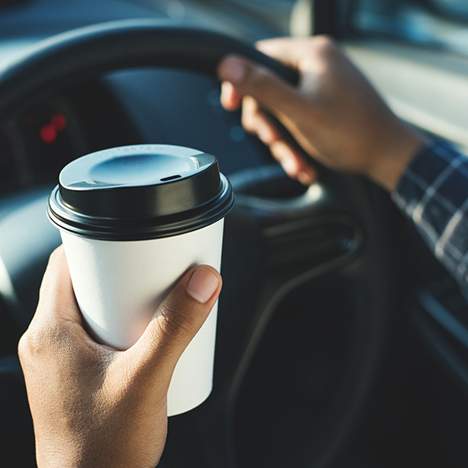Most people associate intoxication with alcohol or illicit drugs. However, there are many other substances that cause people to experience symptoms similar to alcohol or drug intoxication. One substance, which may surprise many individuals, is coffee. Could your daily cup of coffee (a morning routine or popular dessert pairing for millions of Americans) get you in trouble with the law? What if someone was “buzzed” on coffee and started to drive erratically due to coffee intoxication?
When a police officer witnesses a driver operating a vehicle in a suspicious manner, an officer has the right to pull over the driver and perform a field sobriety test. Even though the driver had only consumed a seemingly harmless cup of coffee, could the driver be charged with driving while under the influence, or driving while impaired?
Since the Caffeine Contained in Coffee is a Drug, Can Coffee Intoxicate You?
Coffee is a brewed beverage made from crushed or ground seeds, referred to as coffee beans and contains caffeine. Caffeine is a naturally occurring chemical stimulant that affects the central nervous system. Caffeine is a drug; in fact, it shares many similar characteristics of amphetamines, cocaine, and heroin.
How Much Coffee is Too Much? Caffeine Overdose Symptoms
In moderate doses (about 2 cups), coffee can help people remain alert and less sleepy. However, too much coffee can cause problems. Jokes are often made about people who have had too much coffee and the way they behave; they are portrayed as extremely hyper or unable to sit still. Funny or not, these behaviors are not far from the truth. Symptoms of having too much coffee include:
- Dizziness
- Blurred vision
- Restlessness
- Nervousness
- Increased heartbeat
- Nausea
- Anxiety
- Heart palpitations
- Insomnia
- Sweating
- Dizziness
- Vomiting
- Cardiac arrest
Many of these symptoms may also be experienced by people who have had too much alcohol or who are “high” on drugs.
Caffeine Intoxication While Driving

All jurisdictions base the crime of driving while intoxicated (commonly referred to as drunk driving) on the driver’s blood alcohol content (BAC). For example, in all 50 states it is a crime to drive with a BAC of .08 or above. A driver’s BAC is typically measured by using a breathalyzer, but a blood test or urine sample can also determine BAC. If a driver is intoxicated by coffee, he or she will pass a test that measures BAC. However, encompassed in driving while intoxicated laws are rules that not only prohibit driving while under the influence of alcohol or illegal drugs, but also the prohibition from driving while impaired or while under intoxicating compounds. Such language can be interpreted to also making it illegal to drive while impaired by prescription drugs, over-the-counter drugs, and arguably by other substances such as caffeine.
The goal of driving while intoxicated laws is to prevent people who are impaired from endangering other drivers. Therefore, it should not matter why the driver is impaired. While coffee seems less harmful than alcohol or illicit drugs, one could argue that the penalties for driving while intoxicated by coffee should be the same as someone who is intoxicated by alcohol or drugs, should an accident occur as a result.
If a driver is intoxicated from drinking too much coffee and they are showing signs of reckless driving, a police officer can pull the suspected driver over. If the driver fails a field sobriety test (such as the walk and turn test or the one-leg stand test), the driver could be charged with a driving while intoxicated offense.
Hiring a Lawyer After an Accident Caused by Coffee Intoxication
If you’ve been injured in an accident due to the negligent actions of another individual who was under the influence of caffeine intoxication (or another substance), we may be able to help. The attorneys at Avrek Law have more than 50 years of combined legal experience assisting injury victims. With more than $1 billion recovered for clients, Avrek Law is the firm you want on your side. Contact us today for a free personal injury consultation – we want to hear more about your case!
